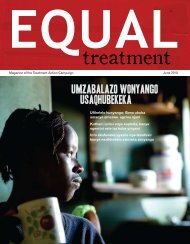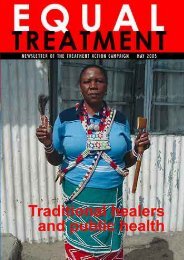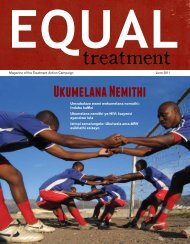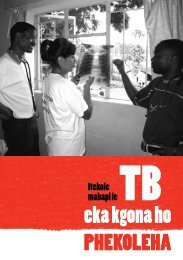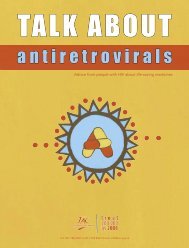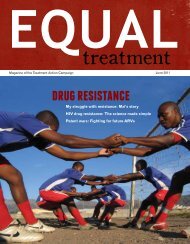ARV's in our lives[swiss].indd - Treatment Action Campaign
ARV's in our lives[swiss].indd - Treatment Action Campaign
ARV's in our lives[swiss].indd - Treatment Action Campaign
Create successful ePaper yourself
Turn your PDF publications into a flip-book with our unique Google optimized e-Paper software.
10<br />
Excretory kidneys, ureters, bladder,<br />
urethra, sk<strong>in</strong>, lungs<br />
Nervous bra<strong>in</strong>, sp<strong>in</strong>al cord, nerves,<br />
sense organs, receptors<br />
Endocr<strong>in</strong>e endocr<strong>in</strong>e glands and<br />
hormones<br />
Lymphatic lymph nodes, spleen, lymph<br />
vessels<br />
elim<strong>in</strong>ates waste; ma<strong>in</strong>ta<strong>in</strong>s water and chemical<br />
balance<br />
controls and co-ord<strong>in</strong>ates body movements<br />
and senses; controls consciousness and<br />
creativity; helps monitor and ma<strong>in</strong>ta<strong>in</strong> other<br />
body systems<br />
ma<strong>in</strong>ta<strong>in</strong>s homeostasis; regulates metabolism,<br />
water and m<strong>in</strong>eral balance, growth and sexual<br />
development, and reproduction<br />
cleans and returns tissue fluid to the blood and<br />
destroys pathogens that enter the body<br />
Integumentary sk<strong>in</strong>, hair, nails protects aga<strong>in</strong>st pathogens; helps regulate<br />
body temperature<br />
Reproductive ovaries, uterus, mammary<br />
glands (<strong>in</strong> females), testes (<strong>in</strong><br />
males)<br />
produces gametes and offspr<strong>in</strong>g<br />
Germs and <strong>our</strong> immune system<br />
As human be<strong>in</strong>gs we are exposed to all sorts of germs all the time.<br />
There are germs <strong>in</strong> the air we breathe, the water we dr<strong>in</strong>k, food we eat,<br />
<strong>in</strong> <strong>our</strong> surround<strong>in</strong>gs. Some germs live <strong>in</strong> <strong>our</strong> bodies for as long as we<br />
are alive.<br />
Germs are not <strong>in</strong> <strong>our</strong> environment to decorate it. They constantly try<br />
to f<strong>in</strong>d ways to make more of themselves and take over (colonise) the<br />
environment. When they f<strong>in</strong>d an opportunity to do so, they will multiply.<br />
Sometimes they do this <strong>in</strong> <strong>our</strong> bodies.<br />
Because there are so many germs around us, we do a lot of<br />
th<strong>in</strong>gs to prevent them from colonis<strong>in</strong>g <strong>in</strong>side us:<br />
• We wash <strong>our</strong> bodies to limit the number of germs on <strong>our</strong> sk<strong>in</strong>.<br />
• We try not to have rubbish ly<strong>in</strong>g around because germs grow<br />
<strong>in</strong> rubbish and that way we limit the number of germs <strong>in</strong> <strong>our</strong><br />
immediate environment.<br />
• We try to f<strong>in</strong>d clean water to dr<strong>in</strong>k to protect <strong>our</strong>selves from<br />
dangerous germs like bilharzia, cholera and others. When<br />
governments provide access to clean water, they are promot<strong>in</strong>g<br />
public health and not just provid<strong>in</strong>g a convenience to people.<br />
But even with all this, some germs can still make their way <strong>in</strong>to <strong>our</strong> bodies and make us ill.<br />
Natural protection from germs<br />
The sk<strong>in</strong> is <strong>our</strong> body’s biggest organ. It provides a barrier aga<strong>in</strong>st germs that <strong>our</strong> bodies would<br />
otherwise be constantly exposed to. Another barrier is the hair <strong>in</strong> <strong>our</strong> nose, which helps prevent us<br />
from breath<strong>in</strong>g <strong>in</strong> some germs.


![ARV's in our lives[swiss].indd - Treatment Action Campaign](https://img.yumpu.com/4307152/18/500x640/arvs-in-our-livesswissindd-treatment-action-campaign.jpg)
